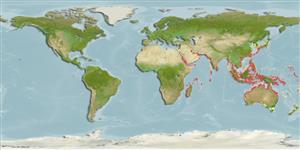Common names from other countries
分类 / Names
俗名 | 同种异名 | Catalog of Fishes(属, 种) | ITIS | CoL | WoRMS | Cloffa
Teleostei >
Carangiformes (Jacks)
鱸形目 (Jacks) >
Carangidae (Jacks and pompanos) > Caranginae
Etymology: Alepes: Greek, alepis, -idos = without scales (Ref. 45335).
More on author: Cuvier.
Environment: milieu / climate zone / depth range / distribution range
生态学
海洋; 半咸淡水; 深度上下限 0 - 10 m (Ref. 86942). 熱帶
Indo-West Pacific: tropical waters.
印度-西太平洋: 熱帶水域。
大小 / 重量 / 年龄
Maturity: Lm ? range ? - ? cm
Max length : 61.0 cm TL 雄鱼/尚未辨别雌雄; (Ref. 117080); common length : 30.0 cm FL 雄鱼/尚未辨别雌雄; (Ref. 3287)
背棘 (总数) : 9; 背的软条 (总数) : 23 - 27; 臀棘: 3; 臀鳍软条: 20 - 23.
这种与 A. 帕拉 相似, 但是有一个身体轮廓是同样中凸的上面与下面。 它的侧线在软背鳍的第三个鳍条之下变成直的。 鳃盖斑块或是不存在或不明显的。 这种达到 40 公分标准体长。
Adults are common in shallow coastal waters where it often swims near the surface. They form dense schools on clear inner reefs, swimming high above substrate (Ref. 48635). They feed chiefly on shrimps, copepods, decapods and small fishes (Ref. 30573, 90102).
常见于沿岸浅水区在哪里它时常在表面巡游。 在清澈的岩礁内侧上形成密集的鱼群, 游泳高于底部。 (参考文献 48635) 主要捕食虾,桡脚类的动物,十足类动物与小鱼。 (参考文献 30573)
Life cycle and mating behavior
Maturities | 繁殖 | Spawnings | Egg(s) | Fecundities | 仔鱼
印度-西太平洋: 熱帶水域。
Paxton, J.R., D.F. Hoese, G.R. Allen and J.E. Hanley, 1989. Pisces. Petromyzontidae to Carangidae. Zoological Catalogue of Australia, Vol. 7. Australian Government Publishing Service, Canberra, 665 p. (Ref. 7300)
CITES (Ref. 128078)
Not Evaluated
人类利用
渔业: 低经济
工具
特别资料
下载 XML
网络资源
Estimates based on models
Preferred temperature (Ref.
115969): 23.8 - 29.2, mean 28.5 (based on 2765 cells).
Phylogenetic diversity index (Ref.
82804): PD
50 = 0.5312 [Uniqueness, from 0.5 = low to 2.0 = high].
Bayesian length-weight: a=0.01148 (0.00712 - 0.01853), b=2.89 (2.76 - 3.02), in cm Total Length, based on LWR estimates for this species & (Sub)family-body (Ref.
93245).
营养阶层 (Ref.
69278): 3.7 ±0.55 se; based on food items.
回复力 (Ref.
120179): 中等的, 族群倍增时间最少 1.4 - 4.4年 (Preliminary K or Fecundity.).
Fishing Vulnerability (Ref.
59153): Moderate vulnerability (44 of 100).
